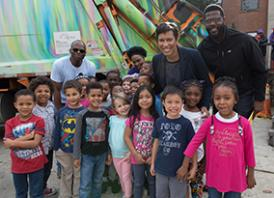 Resilient DC is launching the second phase of its efforts to write a Resilience Strategy under the 100 Resilient Cities framework. Many members of the Urban Waters Federal Partnership are participating in its various working groups, including the only geographically-specific working group focused on the Anacostia River corridor.
Resilient DC is launching the second phase of its efforts to write a Resilience Strategy under the 100 Resilient Cities framework. Many members of the Urban Waters Federal Partnership are participating in its various working groups, including the only geographically-specific working group focused on the Anacostia River corridor.
From the 100 Resilient Cities website:
Our CROs are working in 80+ cities around the world, making technology a critical tool to keep them connected across time and geographies so they can continuously share their insights. We’ve established an online community to complement our regular convenings to make this collaboration possible.
But since the core of the Network is about people—not tools—we are also creating means for CROs to can share deep, rich experiences and contextualize their learning with one another in meaningful ways. This spring we launched a CRO Network Exchange Program through which member cities have the opportunity to co-create immersive learning experiences around common resilience challenges they face—like Durban, Melbourne, and New Orleans coming together to explore the intersection of biodiversity protection, water security, and climate change in their cities. Network exchanges will be a powerful means to strengthen connections among CROs—and perhaps just as importantly, between CROs’ resilience teams—and begin building a collective, global resilience-building knowledge base.
Beyond these formal 100RC Network channels, CROs are reaching out to one another regularly to share insights on their work, celebrate successes, and support each other. It’s amazing to witness the energy of these pioneering urban resilience leaders as they deepen their connections and make this Network their own. As we look ahead to future summits and convenings, we continue to seek out new ways to marshal the incredible enthusiasm, experience, and intellect of our CROs into the Network they want to create: a powerful, peer-led catalyst for resilience building across the world.
One critical problem that 100RC helps cities overcome is the difficulty of sharing information about more and less successful initiatives and practice, which prevents existing resilience solutions from scaling. At the world’s first-ever CRO Summit in New Orleans in November 2014, we launched the 100RC Chief Resilience Officer Network to help break down barriers to sharing solutions and creative problem solving. This incredible event provided the first cohort of CROs the opportunity to come together for four intensive days to learn from one another and the living laboratory of New Orleans. It generated the personal and professional connections that are the bedrock of any strong peer-to-peer network.
100RC supports the adoption and incorporation of a view of resilience that includes not just the shocks—earthquakes, fires, floods, etc.—but also the stresses that weaken the fabric of a city on a day to day or cyclical basis.
Examples of these stresses include high unemployment; an overtaxed or inefficient public transportation system; endemic violence; or chronic food and water shortages. By addressing both the shocks and the stresses, a city becomes more able to respond to adverse events, and is overall better able to deliver basic functions in both good times and bad, to all populations.
Cities in the 100RC network are provided with the resources necessary to develop a roadmap to resilience along four main pathways:
- Financial and logistical guidance for establishing an innovative new position in city government, a Chief Resilience Officer, who will lead the city’s resilience efforts
- Expert support for development of a robust Resilience Strategy
- Access to solutions, service providers, and partners from the private, public and NGO sectors who can help them develop and implement their Resilience Strategies
- Membership of a global network of member cities who can learn from and help each other.
Through these actions, 100RC aims not only to help individual cities become more resilient, but will facilitate the building of a global practice of resilience among governments, NGOs, the private sector, and individual citizens.
100 Resilient Cities—Pioneered by The Rockefeller Foundation is financially supported by The Rockefeller Foundation and managed as a sponsored project by Rockefeller Philanthropy Advisors (RPA), an independent 501(c)(3) nonprofit organization that provides governance and operational infrastructure to its sponsored projects.
100RC has staff and offices in New York, London, Mexico City, and Singapore to support the work in cities across regions.
